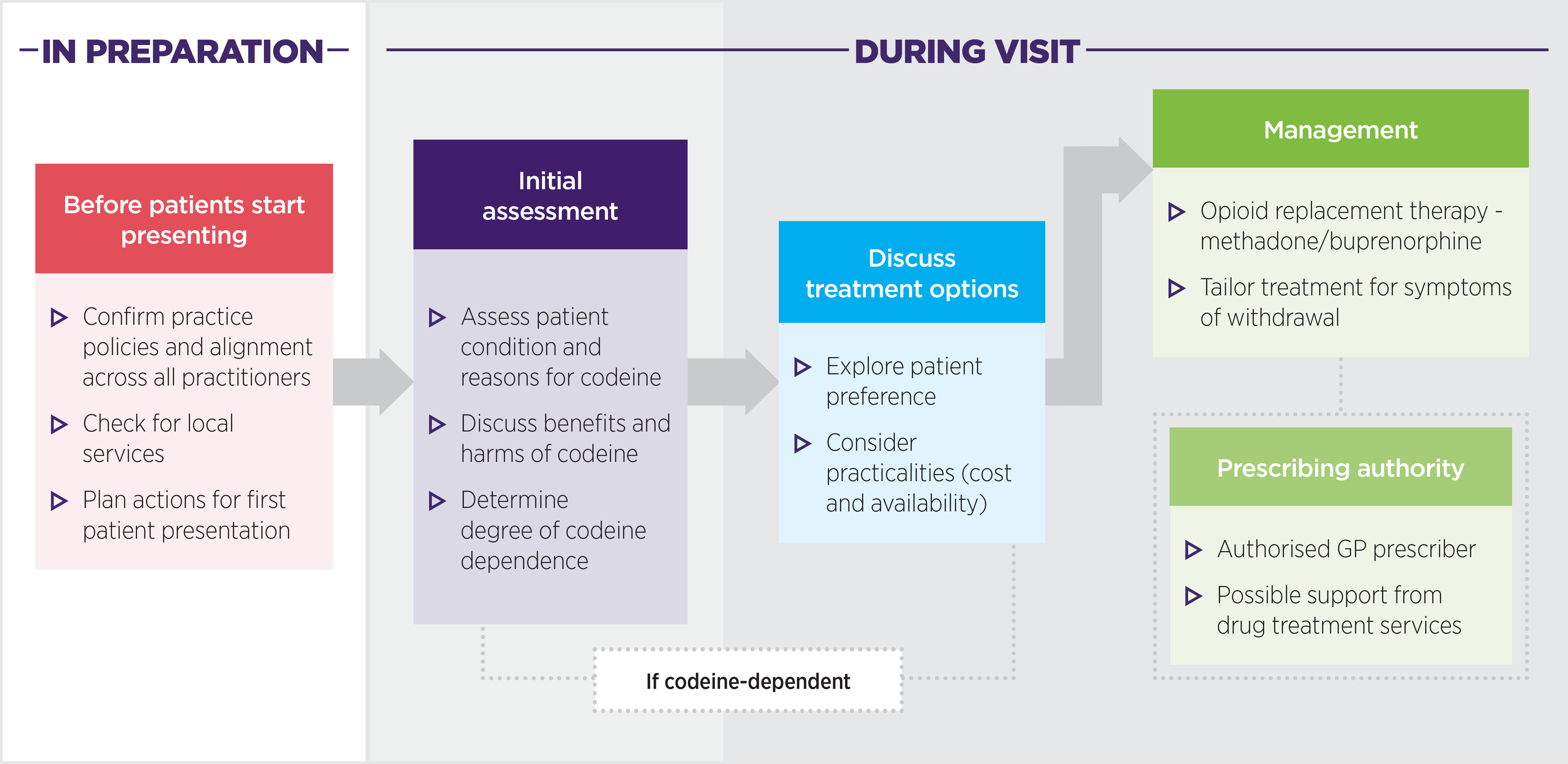Dr Malcolm Dobbin and Dr Jill Thistlethwaite discuss codeine misuse disorder and the diagnosis of codeine dependency.
Key points
- From 1 February 2018, medicines that contain low-dose codeine are no longer available without prescription.
- The medicines affected include codeine-containing combination analgesics, available under brand names such as Panadeine, Nurofen Plus and Mersyndol, and pharmacy generic pain relief products, and codeine-containing cough, cold and flu products, available under brand ranges such as Codral, Demazin and pharmacy generic cough, cold and flu medicines.
- Research shows that low-dose (< 30 mg) codeine-containing products, formerly available over the counter, offered little additional pain relief when compared to similar medicines without codeine.
- There is evidence to suggest that paracetamol/ibuprofen combinations available as a single pill can be offered as an alternative to codeine-based analgesics for short-term management of pain in patients able to take NSAIDs and for whom paracetamol alone is not sufficient.
How to answer the top 5 codeine upscheduling consumer concerns
Debbie Rigby, Advanced Practice Pharmacist and NPS MedicineWise board member, offers tips to pharmacists to address key consumer concerns about OTC codeine changes.
Medicinewise News: After over-the-counter codeine: opportunities for better care

With low-dose codeine becoming prescription-only from 1 February 2018, health professionals and communities are preparing for the change. Find out more about transitioning to a post-OTC codeine world.
Supporting patients with codeine dependence

NPS Medicinewise has developed clinical advice on how best to prepare for and manage patients requesting codeine, who may be codeine-dependent.
For pharmacists - talking to your patients about the changes in codeine access

From 1 February 2018, all medicines containing codeine require a prescription.
You may want to suggest the use of alternative products that are available over the counter, or advise the patient to discuss their pain and cough, cold and flu management options with their GP.
Over-the-counter codeine: hospitalisation costs revealed

With codeine requiring a prescription from 1 February 2018, attention is being focussed on hard data supporting the decision. New research analyses hospital admissions to a large Australian hospital to quantify the costs of OTC codeine misuse. These costs are significant and form just part of the total costs to both patient health and the healthcare system.
Codeine-related deaths: a cause for concern

Codeine-related deaths in Australia more than doubled from 2000 to 2009. This is a serious issue for doctors and pharmacists.
Find out more about a 2015 study investigating this worrying trend.
Medicinewise News: After over-the-counter codeine: opportunities for better care

With low-dose codeine becoming prescription-only from 1 February 2018, health professionals and communities are preparing for the change. Find out more about transitioning to a post-OTC codeine world.
Patient action plan
Resources for GPs
A wide range of resources is available to GPs with patients who ask for codeine. Find them all together on one page.
Paracetamol/ibuprofen combinations for acute pain

Evidence suggests that paracetamol/ibuprofen combinations available as a single pill can be offered as an alternative to codeine-based analgesics for short-term management of pain.
- 18 Aug 2017
- 16 min
- 18 Aug 2017
- 16 min
- 18 Aug 2017
- 12 min
- 18 Aug 2017
- 12 min
- 18 Aug 2017
- 19 min
- 18 Aug 2017
- 19 min
Codeine FAQs for your patients

Find answers to frequently asked questions about the changes to codeine availability.
Patient resources in English and community languages
To order free printed factsheets, click here
New rules for medicines with codeine - Easy English (with pictures)
Date published : 12 January 2018
De nouvelles règles pour les médicaments avec de la codeine (French)
Date published : 15 December 2017
Medicinewise News: Chronic pain

Evidence suggests that medicines are overused to treat chronic pain. Guidelines recommend medicines only as an adjunct to non-pharmacological options.
Biopsychosocial management of chronic pain
This management plan is designed to help you provide advice to your patients on the biopsychosocial approach to managing their chronic pain. Use this tool to facilitate a discussion with patients about the importance of incorporating non-pharmacological strategies into their pain management.
Videos - patient and prescriber perspectives on codeine
Dr Adrian Reynolds, Clinical Associate Professor and President of the Chapter of Addiction Medicine at RACP, gives advice to GPs on recognising and treating codeine addiction.
Dr Malcolm Dobbin, Public Health Physician, reveals how GPs can diagnose and treat opioid dependence in their patients.
Dr Simon Holliday, Rural GP and Addiction Physician, talks to Dr Jill Thistlethwaite, Medical Adviser at NPS MedicineWise, about codeine dependency and helping patients with their pain.
Peter was a fun-loving father and sports enthusiast, until a work accident left him in agonising pain. Over time, he became dependent on codeine - he misused these medicines and his life spun out of control.
Chris was a happy-go-lucky dad, until a tragic horse accident left him in severe pain. Chris shares his battle with codeine dependence and misuse.
Newlywed Julia was enjoying a bike ride when she was suddenly struck by a car, leaving her with chronic pain. She felt herself growing more and more dependent on codeine just to get through the day.
Peter was a fun-loving father and sports enthusiast, until a work accident left him in agonising pain. Over time, he became dependent on codeine - he misused these medicines and his life spun out of control.
Chris was a happy-go-lucky dad, until a tragic horse accident left him in severe pain. Chris shares his battle with codeine dependence and misuse.
Newlywed Julia was enjoying a bike ride when she was suddenly struck by a car, leaving her with chronic pain. She felt herself growing more and more dependent on codeine just to get through the day.
In the first of a two-part series, Dr Malcolm Hogg, Head of Pain Management Services at Royal Melbourne Hospital offers guidance on assessing and managing patients with chronic pain.
In part two, Dr Malcolm Hogg discusses key factors to consider when treating chronic non-cancer pain.
Hear from different perspectives about the effects of medicines with codeine.
National support services
Alcohol and Drug Information Service (ADIS)
Australian Pain Management Association
Pain Link Helpline 1300 340 357
Healthdirect Australia - 24 Hour Health Advice Line 1800 022 222
Medicines Line - 1300 MEDICINE (1300 633 424)
George report: Review of the efficacy and safety of over-the-counter codeine containing analgesics for pain and codeine-based antitussives
Combination codeine medicines are widely available over-the-counter and concerns over misuse have risen. Common indications for use include headache, back pain, dental pain and post-surgical pain. The aim of this systematic review was to determine the efficacy and safety of over-the-counter codeine combination analgesics for the treatment of any pain condition or as an anti-tussive.
Regulation impact statement: Codeine rescheduling
The Department of Health, through the Therapeutic Goods Administration (TGA), has reviewed OTC access to codeine-containing medicines in Australia to ensure that regulation protects public health and safety.
Codeine is a commonly used medicine of abuse. Codeine in over-the-counter (OTC) combination analgesics and codeine dependence contributes to severe adverse health outcomes associated with overdose of other active constituents such as paracetamol or ibuprofen. There is substantial evidence of harm from abuse or misuse of codeine-containing medicines, including liver damage, gastrointestinal perforations, respiratory depression and death.

